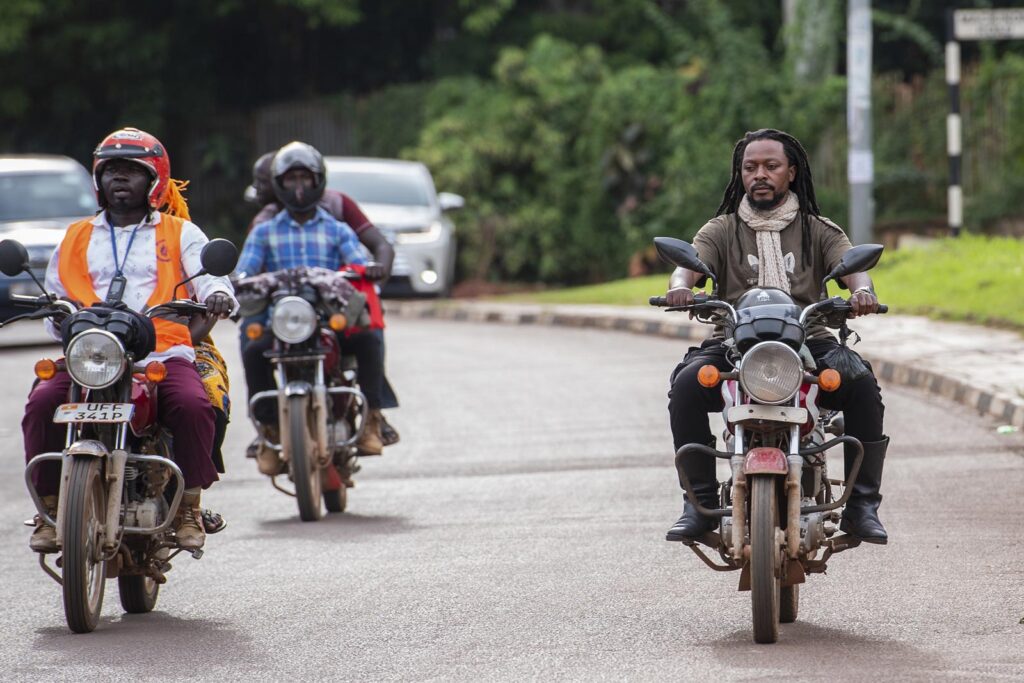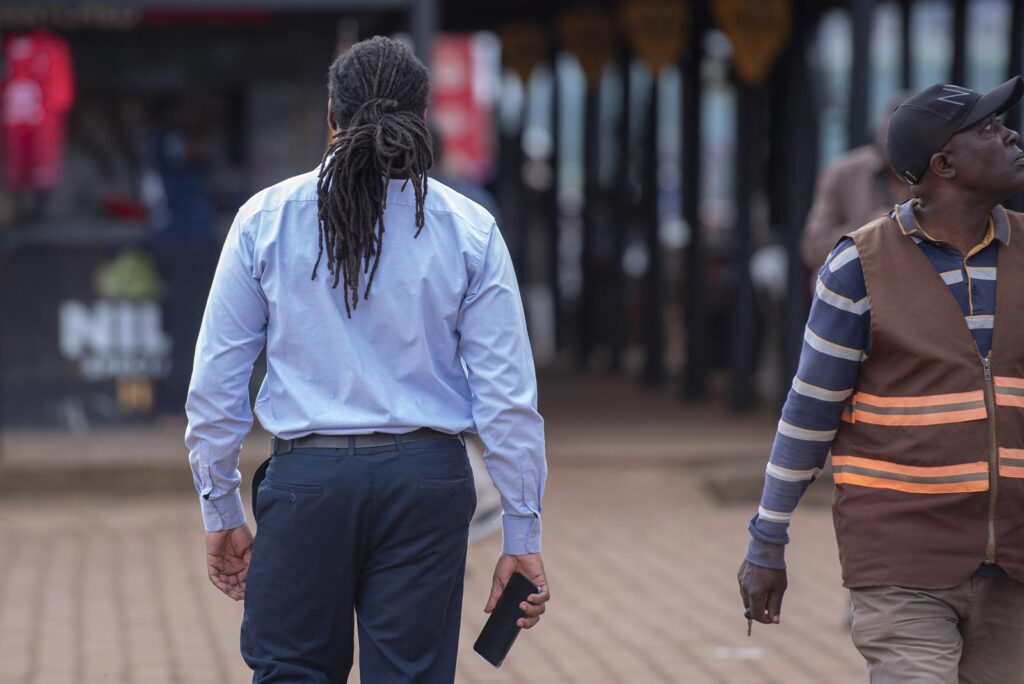We had a neighbor who had (the late South African reggae artist) Lucky Dube’s portrait in his room and I liked it so much. I was 9 years old, and I could not decide for myself on whether to grow the dreadlocks because I was still young.
– Ivan Lubulwa, also referred to as Dogota
Kampala resident
On March 10, 2021, the Uganda Police Force (UPF), acting on what they called intelligence to avert a planned protest in Uganda’s capital city, Kampala, arrested and detained more than 60 people. Many of those arrested, roughed up, and later released without charge, had dreadlocks.
The police spokesman at the time, Patrick Onyango, said in a statement that those arrested were suspected to be planning to “cause havoc” or stage protests in the city. But many of those later released without charge said they had no idea a protest was planned.
In December 2020, police arrested Bukeni Ali. Also known as Nubian Li, the musician and opposition supporter was held on Kalangala, an island in Lake Victoria, for months. After his release, he said his dreadlocks were forcibly cut off.
And in 2018, police swept through Kampala to arrest 400 people accused of theft and other crimes, and later through Kisenyi, a site with many informal settlements, where they arrested more than 300 people labeled as “thugs.” A year later, another sweep led to the arrest of 400 more people. Police spokesman Onyango said at the time they would need to screen those arrested before they would appear in court. Critics said the widespread arrests included some people with dreadlocks who were simply in the wrong place.
The Center for Collaborative Investigative Journalism found that many people, especially men, in Uganda fear police targeting for their dreadlocks, or other forms of discrimination, such as being denied jobs or opportunities. There are several cases of people wearing dreadlocks reporting being arrested without charges, simply due to being present near a political protest and having dreadlocks, or seen as affiliated with drugs and criminality in urban centers. Others say they were denied job opportunities unless they changed their hairstyle, and in some cases people were forced to cut their hair either by police during a detention, from attacks motivated by hatred, or under pressure from institutions denying them service.
“They call us drug addicts and bayaaye (crooks),” said Patrick Bavumula, who wears dreadlocks. “We have been segregated to the extent of being denied jobs because of how we look.”
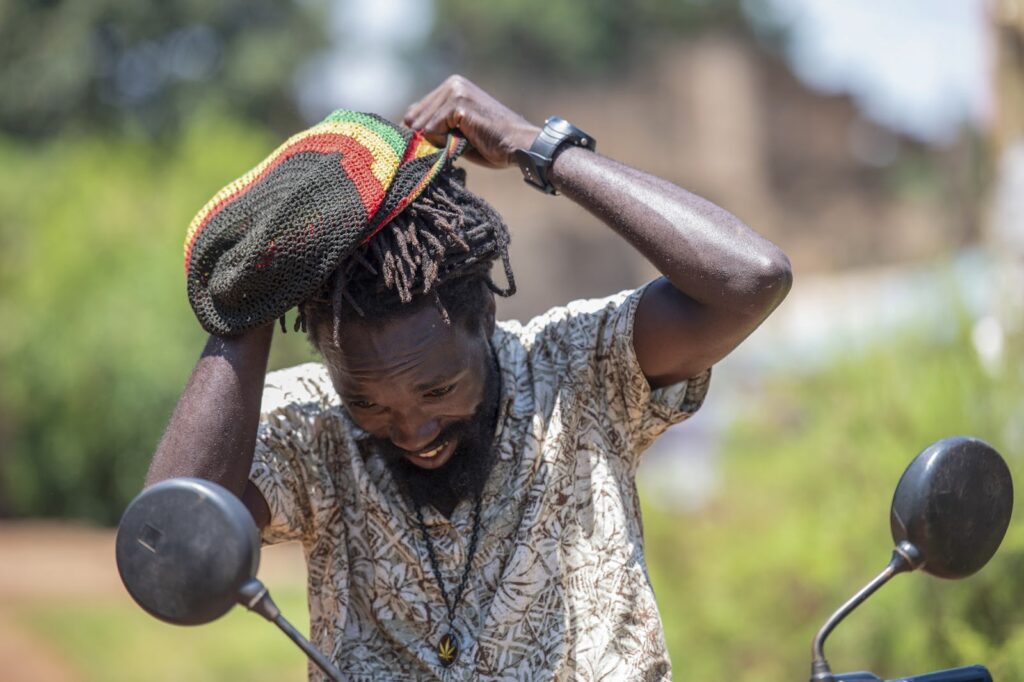
I wanted to show (my mother) that even with this kind of hair, I was still a decent person like any other. Well-intentioned, (the way) any parent would wish his or her child to be.
– Dogota
Kampala resident
Challenges of proving targeting occurs
It’s difficult to prove a person was unfairly arrested directly linked to having dreadlocks. The hairstyle is rarely referenced in police statements and when people are held, roughed up and released, there is little documentation to prove why or what happened. In searches for the words “dreads” or “dreadlocks” on the Uganda Police Force announcements, Uganda’s Media Centre, or the Judiciary of Uganda, no results came up. Three police sources from different parts of Kampala told the CCIJ they couldn’t comment publicly due to fearing for their jobs: however, they said such targeting does exist. They declined to provide documentation to prove people were held and released without charges.
Many people with dreadlocks say they fear police target them and associate their hairstyle with criminal behavior or opposition support. Collecting comprehensive and accurate data on the experiences of individuals with dreadlocks is inherently challenging, as it not only depends on self-reporting which may be subject to underreporting or bias, but also involves the nuanced interpretation of personal encounters, which can vary widely in perception and reporting, making it difficult to generalize findings. In a survey of 133 Ugandans conducted by the CCIJ between August and October 2023, 36 people had worn dreadlocks at one time. Of those, 14 people said they had experienced discrimination, and nine said they had experienced harassment. Twenty people said they had been forced to change their hairstyle for a job, school or other opportunities, and seven said they had been stopped or questioned by police at least one time. Of those who said they had been targeted by police, they most commonly reported that it happened in a public space, such as a park or street.

Ssemakula Issa Mukasa, the Secretary for Defense of the Rastafarian Community in Uganda (RCU), told the CCIJ that his office has on many occasions pushed for the release of colleagues wearing dreadlocks who were arrested as suspects, primarily because of their hairstyle.
Mukasa, whose office is nestled in Kalerwe in Kawempe Division of Kampala – an area with many informal settlements, high levels of poverty, and where many people with dreadlocks can be found – also said a majority of the arrests are never documented. This makes it hard to follow up for either legal redress or any other form of remedial action. Often the most they can do is informally lobby for the person’s release.
Patrick Onyango, the spokesperson of the Kampala Metropolitan Area Police, denied that the police specifically target people with dreadlocks. “We do not act by mere appearance of somebody. We don’t arrest you because of mere appearance,” he said. “There are important people in this country with dreadlocks, have you seen us arresting them?”
Onyango added that police would only target someone if they had information that person had a criminal background. “If intelligence gets information that so and so participates in criminality, and we have concrete information, that is when we target you and arrest you,” he said. “But when you don’t have any criminal record, we don’t arrest you just like that.”
Still, a fear of targeting and unfair arrest means many people with dreadlocks make choices to avoid increasing their risk, said Ivan Lubulwa, also referred to as Dogota, who has worn dreadlocks since 2017. He works as a boda boda rider, a commercial motorcycle driver.
“It is dangerous for us to move at night because the moment operations are mounted by police or any other security organ, then you are the first [category of] people to be arrested,” he said. Since he decided to grow dreadlocks, he avoids staying out past 6 p.m. “We also find it hard to fit in communities and lead comfortable lives like other persons in our own country.”
Uganda’s legal system allows police (or even citizens) to arrest someone on a suspicion they may be about to commit a crime. A 2005 report from a US-based law school International and Comparative Law review article said, “This leads to further problems because, in Uganda, arrests lead to detention, and when an arrest is made by an unqualified law enforcer, arbitrary arrests and unreasonable detentions become far too common, and in turn overwhelm the penal institutions.” That report said many people can then be arrested due solely to being friends of suspects, people who were seen in the same area as a suspect prior to the crime, or even innocent bystanders. The law also requires anyone arrested to appear in court within 48 hours, but numerous human rights reports say that timeframe is often not met.
The U.S. Department of State 2022 Country Report on Human Rights Practices also reported arbitrary and unjustified arrests, and said the “government was reluctant to investigate, prosecute, or punish officials who committed human rights abuses or engaged in corruption, whether in the security services or elsewhere in government, and impunity, including for serious abuses, was a problem.”
Dogota said he decided to wear dreadlocks due to his passion for the late South African reggae artist Lucky Dube. “We had a neighbor who had Lucky Dube’s portrait in his room and I liked it so much,” he said. “I was 9 years old, and I could not decide for myself on whether to grow the dreadlocks because I was still young.” Dogota said when he finally decided to grow dreadlocks in 2017, his mother was convinced it was a sign he was becoming connected to “rogue elements” in the community.
“The moment she noticed my dreadlocks, she immediately got a wrong impression about me,” he said. “I had to work extremely hard to disprove her and other people about me having this kind of hair.”
Dogota said he often hides his hair, and works hard to prove to his family that he can earn a decent living despite his hairstyle. He bought his mother a 14-inch color television, something she had never owned before. “I wanted to show that even with this kind of hair, I was still a decent person like any other. Well-intentioned, (the way) any parent would wish his or her child to be,” he said.

My best friend chose me as his best man. The family objected because I had dreadlocks but as the groom he still insisted on me. I felt his pressure and had to cut it off. The parents, they were uncomfortable with men who grow hair and it would be a shame if they accepted a man with locked hair as their sons best man, so I had no choice but cut them off.
– Moses Banalekaki
Member of the Rastafarian Community in Uganda (RCU)
The right to wear dreadlocks
It’s not illegal to wear dreadlocks in Uganda, said Noah Muwanguzi, a practicing lawyer and advocate of the Court, who is based in Kampala.
“People wear dreadlocks for a variety of different reasons,” Muwanguzi told CCIJ in an interview. “Some do so as an expression of their religious beliefs, culture or fashion, among others. All these sets of people have the right to do so and this right is protected under the law.”
Articles 21(2), 29 and 37 in the Constitution protect citizens from discrimination for religious or political reasons, and protect the right to freedom and expression.
“A person also has the right to enjoy, profess and practice any culture, tradition, creed or religion,” Muwanguzi said, according to Article 37. “In view of the above Articles of the Constitution of Uganda, a person has the right to wear dreadlocks. There is no known law under the laws of Uganda that impedes that right.”
The Universal Declaration of Human Rights also articulates similar protections of religion and freedom of expression and Uganda has also ratified many United Nations treaties agreeing to protect human rights.
But the right to have the hairstyle doesn’t mean discrimination doesn’t happen. While there may be people wearing dreadlocks who are justly charged with crimes, taken to court and face a fair legal process, many of them are also detained and later released with no charges, according to Nicholas Bwanika Bbale Mugerwa, the secretary of publicity of the RCU. He said many people with dreadlocks choose to lead an isolated life because of the possibility of unfair treatment.
“When Rastafarians are imprisoned, security operatives immediately cut off their hair,” said Mariam Matovu, the women’s leader at the RCU. She said the organization pays between $15 to $25 dollars (between 60,000 and 100,000 Ugandan shillings) each time they need to repair someone’s dreadlocks after they were cut off. “I can’t estimate the amount of money I have invested,” she said. “We lack funds, but most Rastas complain about (police) cutting their hair and imprisoning them unfairly.”
The challenge of such targeting is similar in other countries as well. In Cameroon, there were reports soldiers targeted people with dreadlocks, associating them with separatist fighters. In Mali, a journalist said his dreadlocks were cut while in detention. In Nigeria, people fear that police target people with dreadlocks and tattoos. In Guinea, a detained musician said police targeted him due to his dreadlocks, thinking he was a protester.
There are also fears that Uganda’s new Anti-Homosexuality Act, passed in 2023, could lead to further targeting of men with long dreadlocks. Previous sweeping arrests, such as when 44 people were arrested at an LGBTQ shelter in 2021, included men wearing dreadlocks, according to videos and photos shared on social media. In Malawi, men wearing their hair long can be arrested under the section on Idle and Disorderly Persons. The Human Dignity Trust said this law is seen as criminalizing gender expression.
In November 2023, Uganda’s Minister of State for Gender and Culture Affairs submitted a statement to Parliament on the 16 days of activism campaign against GBV 2023, which runs from Nov. 25 to Dec. 10. The campaign aims to increase public awareness of gender-based violence, increase reporting of cases and access to services for survivors and victims, and enhance accountability. The statement refers primarily to sexual violence and this year’s theme of prevention of violence against women and girls, although it acknowledges that both women and men can be victims of gender-based violence.
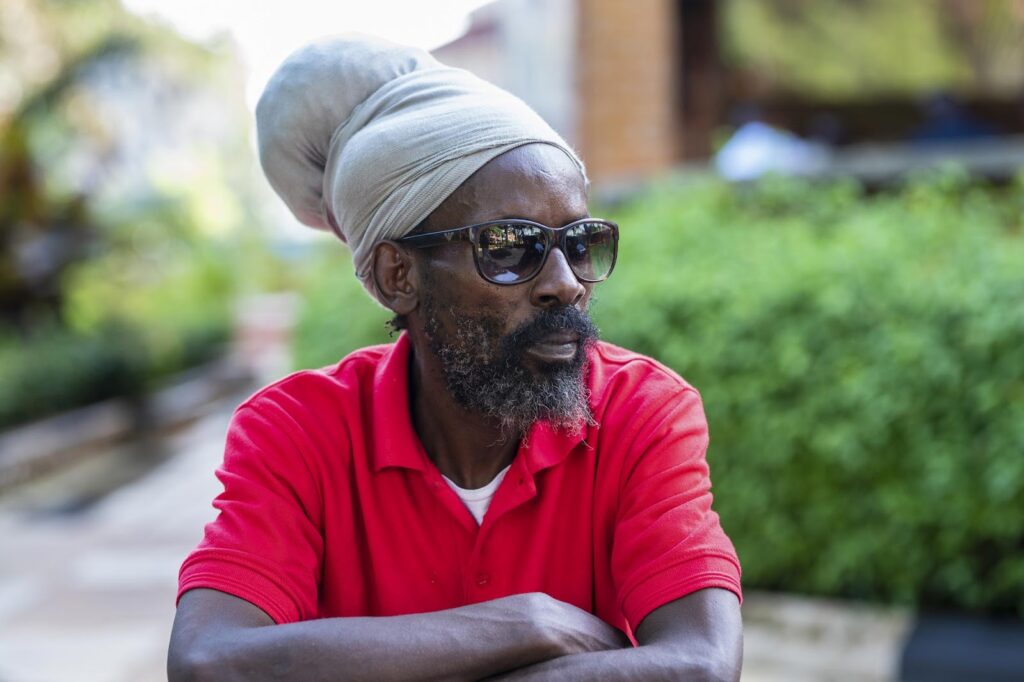
More than two thirds of survey respondents said they “strongly disagreed” or “disagreed” that police treat people with dreadlocks fairly.
– CCIJ SURVEY RESULTS
A precedent of human rights violations
Uganda is regularly cited as a country with high levels of police corruption and brutality. About three quarters of respondents in Uganda said they believe police are involved in corruption, according to an Afrobarometer survey. More than half of the respondents said they believe police “often” or “always” use excessive force in managing protests and dealing with suspected criminals. Amnesty International has referenced cases of arbitrary arrests during political protests and in the lead-up to elections, during protests against the cost of living, and targeting specific groups such as the LGBTI community.
The Uganda Human Rights Commission has repeatedly raised concerns about police brutality and other human rights abuses. Two Facebook groups document police brutality in Uganda with videos or photos of people being beaten or injured by Uganda police or security forces.
In February 2023, the government announced the Office of the United Nations High Commissioner for Human Rights (OHCHR) in Kampala would be closed after its contract ended. A February letter sent from Uganda’s Ministry of Foreign Affairs to the OHCHR, said that it was no longer needed due to “the prevailing peace throughout the country, coupled with strong national human rights institutions and a vibrant civil society—with capacity to monitor the promotion and protection of human rights.”

Police spokesman Onyango said it may be that people feel targeted even when the police adhere to proper procedure.
“If we are carrying out an operation, and you are with dreadlocks or not, we get you taking marijuana, or engaging in any crime, definitely we can’t say because you have dreadlocks we can’t arrest you,” he said. “So it is their perception that they have been targeted.”
Smoking marijuana remains illegal in Uganda, despite media reports that a Supreme Court decision had loosened the restrictions. The new Narcotics and Psychotropic Substances (Control) Bill, passed in August 2023, allows for the production of marijuana for medical use, and enforces strict regulations related to substance abuse.
Amid discussions of police brutality, people with dreadlocks are a minority among other groups that report targeting, such as activists or opposition supporters.
“Because they are few, when they are arrested, they think they are being targeted, they want favors,” Onyango said. “You know when you are lonely in a family, (when) you are the only one, you want to believe that anything that is done to you is wrong that they are now targeting you.”
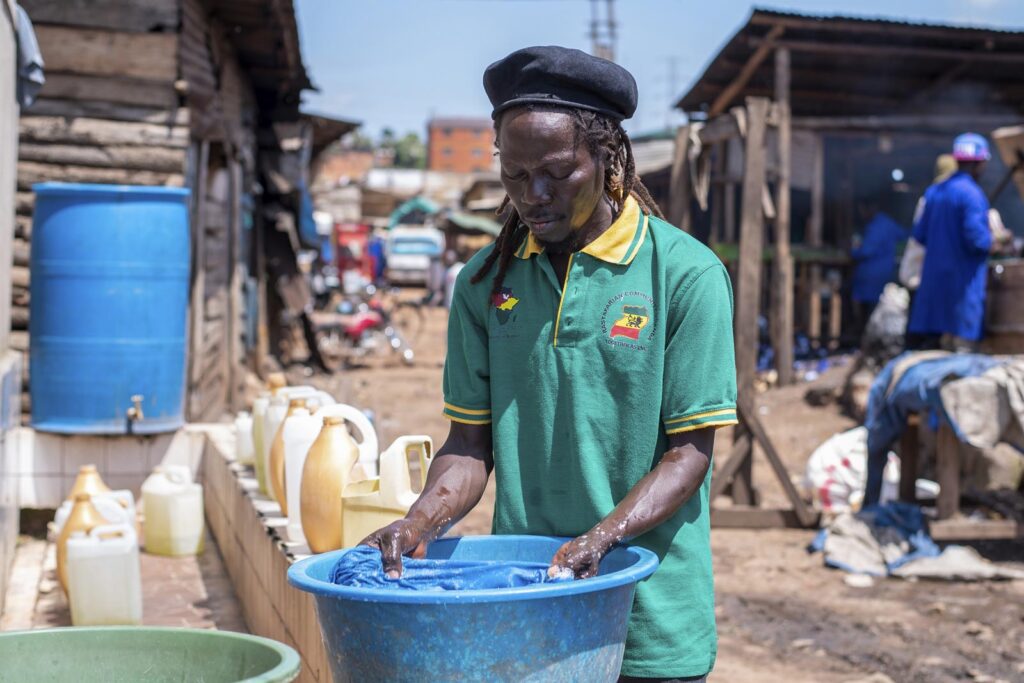
Nearly half of survey respondents without dreadlocks “strongly disagreed” or “disagreed” that they would be likely to hire someone with dreadlocks.
– CCIJ SURVEY RESULTS
A hairstyle does not make a thief
Dreadlocks have several affiliations across Uganda that can contribute to different types of state-sanctioned discrimination. These include historical links to armed rebel groups, associations with drug dealers and criminality in urban centers, connection to the Rastafarian religious community, links with opposition groups and their supporters, such as former dreadlock-sporting opposition politician Robert Kyagulanyi Ssentamu, also referred to as Bobi Wine, and a connection to hip hop culture and wealth.
In the northern region of the country, the Lord’s Resistance Army rebel group that terrorized communities between 1987 and 2012 were often identified as having dreadlocks and unkempt appearances. In recounting the abuses perpetrated by the group, people would often refer to their dreadlocks as the way they knew it was the LRA. “When in the bush and actively fighting, the LRA had been famous for dreadlocks,” according to a book about the LRA. “A number of the commanders had cut their hair before showing themselves publicly to shed the bush fighter image.”
There are other affiliations of dreadlocks with criminality in Uganda, particularly in urban centers. In the survey conducted by the CCIJ, some of the most common words respondents said they associated with dreadlocks, especially among those who don’t wear them, included: rasta and rastafarian, cool, drugs and weed, ugly, smokers, criminal and thugs.

“When a security person finds me near drug lords, he will point fingers at me first because of the dreadlocks,” said Brian Agaba, a member of a Savings and Credit Cooperative Organization that is focused on helping Rastafarians. “I don’t take alcohol or drugs. It helps me shield myself against the wrong characters.”
Agaba said his family would call him a criminal or fraudster, and even forcefully cut his hair off. But he feels that he falls sick without the dreadlocks, and now maintains them and grows them so long he has offers to cut them and sell them on the black market.
Moses Banalekaki said he was forced to cut off his dreadlocks to act as best man in his friend’s wedding.
“The (groom’s) parents were not in agreement with me being the best man because I had locks on me,” he said. Banalekaki said later the groom’s father told him that since the family was Muslim, had he worn dreadlocks in the wedding, “‘it would spoil their reputation as a family.’”
The same came for job searches. “Many times I have applied for jobs both from government and private owned entities but the conversation always goes back to you cutting hair, in spite of how capable I am and how ready I am for the job,” he said.
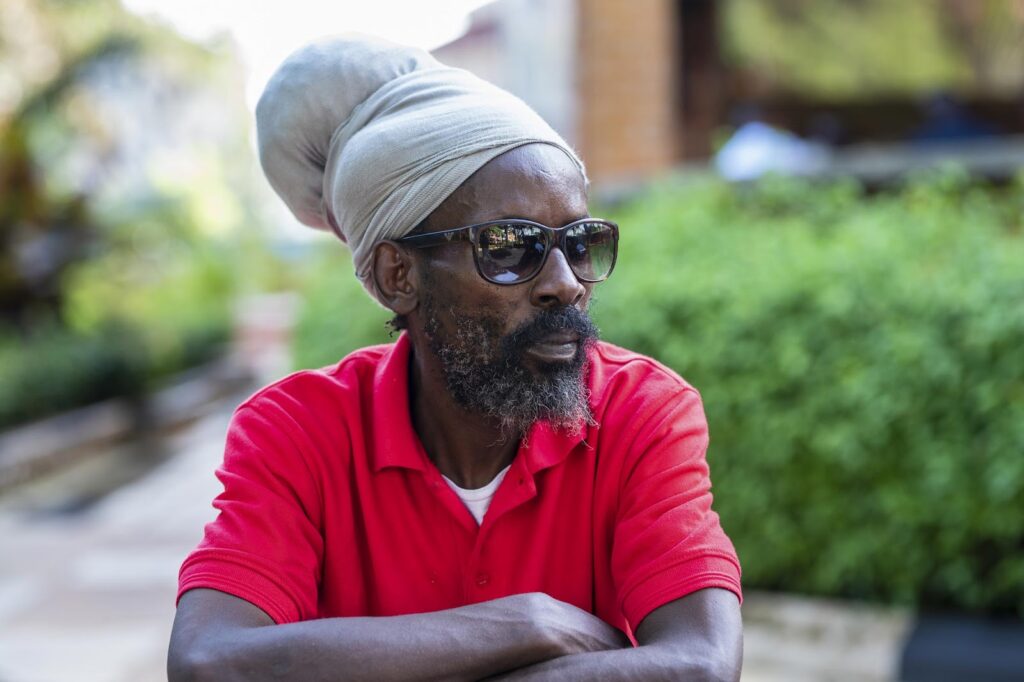
More than a third of survey respondents who had never worn dreadlocks said they are not a professional hairstyle.
– CCIJ SURVEY RESULTS
Spirituality and hair
Many of those growing dreadlocks identify themselves as Rastafarian, like Agaba, and say their hair is linked with religion and spirituality. The religion began in Jamaica in the 1930s, and is affiliated with slavery and fighting oppression. The movement combines elements of Christianity, mysticism, and pan-African political consciousness, according to the Encyclopaedia Britannica. “Rastafari “livity,” or the principle of balanced lifestyle, includes the wearing of long hair locked in its natural, uncombed state, dressing in the colours of red, green, gold, and black (which symbolize the life force of blood, herbs, royalty, and Africanness), and eating an “I-tal” (natural, vegetarian) diet,” according to the article. It says dreadlocks are linked with a reading of Leviticus in the Old Testament, that admonishes the cutting of hair. “Religious rituals include prayer services, the smoking of ganja (marijuana) to achieve better “itation” (meditation) with Jah, and “bingis” (all-night drumming ceremonies).”
Jamaican musician Bob Marley, who popularized reggae music, wore dreadlocks and identified as Rasta.
“People don’t want to know about the culture. A Rasta understands that the spirit of God will lead and guide them,” said Patrick Bavumula, who wears dreadlocks.
Dreadlocks and political opposition
Uganda’s President Yoweri Museveni has been in power since January 1986, more than four times longer than the country’s notorious former President Idi Amin, who is known for his brutal dictatorship. Museveni’s presidency is accompanied by reports of crackdowns against protesters and opposition figures, including arbitrary arrests, disappearances, and torture of those who oppose him.
One of those opposition figures is Robert Kyagulanyi Ssentamu, a pop star referred to as Bobi Wine. In 2017, the dreadlock-sporting rapper who came from Kamwokya, one of Kampala’s informal settlements and the same location where police have done sweeping arrests of hundreds of “thieves” and “thugs,” ran for a seat in a by-election. In a surprise to many at the time, he won a seat and became the Member of Parliament for Kyadondo East.
Bobi Wine served just one term in parliament, before forming the National Unity Platform (NUP) opposition political party. In 2021, he ran against Museveni in the country’s presidential elections. Bobi Wine has been repeatedly arrested, put under house arrest, detained and assaulted by police during his time in opposition. His supporters – many of whom come from low-income areas – have faced a similar fate during protests and rallies. Although Bobi Wine cut his dreadlocks as he entered politics, many of his supporters still sport dreadlocks, along with the color red. The affiliation means people with dreadlocks are often seen as opposition supporters just by their presence in the low-income neighborhoods where they reside.
And it’s not only men who face such discrimination. Women with dreadlocks, particularly those supporting opposition groups or vocally opposing Museveni’s leadership, such as activist Stella Nyanzi, have also been arrested or had their hair cut during the police crackdowns on protesters.
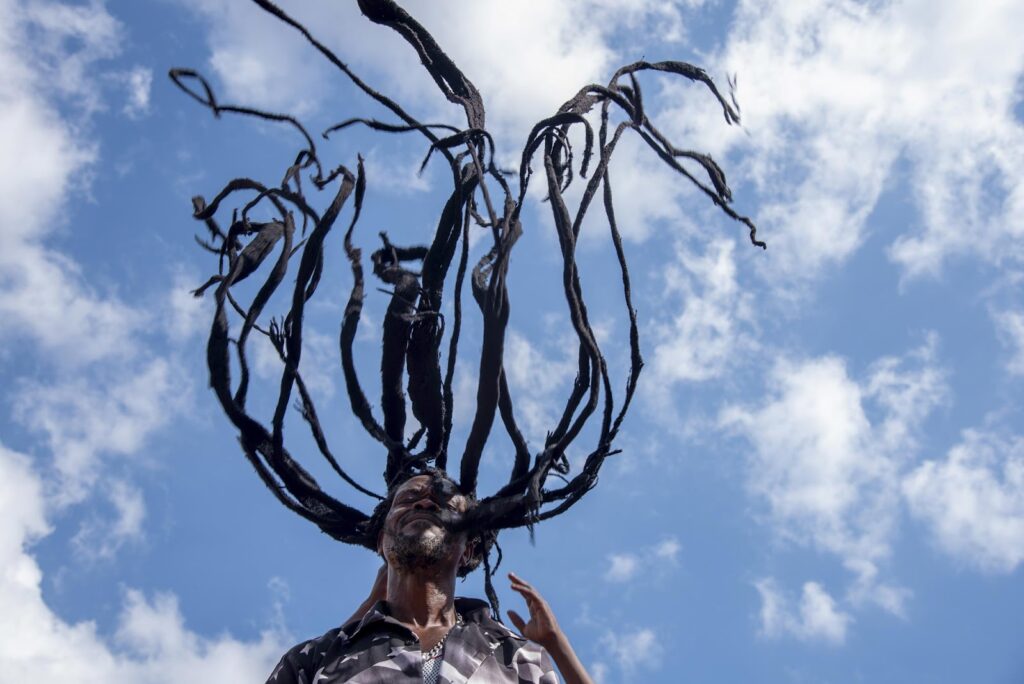
More than a third of the people responding to the CCIJ’s survey who had never worn dreadlocks said they would not trust someone with dreadlocks.
– CCIJ SURVEY RESULTS
Discrimination in hiring practices
Just as police targeting can be difficult to prove, discrimination against dreadlocks within government and other institutions can be hard to specifically identify. In the survey CCIJ conducted, nearly half of respondents without dreadlocks “strongly disagreed” or “disagreed” that they would be likely to hire someone with dreadlocks. Among people who have worn dreadlocks, just 15 per cent felt the same.
“We do not employ people with dreadlocks because we follow the public service order code of conduct,” said the human resource officer of one of Uganda’s government institutions. The officer spoke to the CCIJ anonymously. “In public service, we have something called public appearance which is our appearance in public. We must be decent, and dreadlocks are not part and parcel of decency.”
The Uganda Public Service Standing Orders 2021 has no specific definition or provision banning the wearing of dreadlocks. However, there is a provision that says: “A male public officer shall dress decently in a neat and respectable suit, trouser, shirt. Jacket, tie and closed dark shoes and maintain well-groomed hair (colour).”
More than a third of the people responding to the CCIJ’s survey who had never worn dreadlocks said they are not a professional hairstyle, while among respondents who have worn them at one time, three quarters disagreed.

Very few high profile public servants in Uganda wear dreadlocks. City lawyer Isaac Ssemakade, who to date wears and grows dreadlocks, faced criticism for his hairstyle. Ssemakade is dubbed a “legal rebel” in articles and on social media.
Jimmy Akena of the Uganda People’s Congress (UPC), the son of the late Apollo Milton Obote, who served as Uganda’s second President after independence, cut his dreadlocks. According to media reports, he was “advised to cut” them to help him get elected.
Mawanda Kaggwa said he struggled to find a job, in part because many workplaces required him to remove his dreadlocks. During the pandemic in particular, he said many Rastafarians were struggling to find work, so they started a Savings and Credit Cooperative Organization to support them. Kaggwa is now the chairman.
“In most jobs, I am told to cut off my hair,” Kaggwa said, but he has refused many times in his life. “The perception is that we don’t work. Society has considered us lazy,” he said, adding many Rastas are jobless due to the discrimination. He said in high school he was suspended for his hair, and earlier in his career he was denied a teaching job because he refused to cut off the dreadlocks. He was also denied a job at an office. He still wouldn’t cut his hair.
“This (Having dreadlocks) is like a calling,” he said. “I believe that my hair is an antenna that connects me to the spiritual world.”
This discussion of religious freedom and dreadlocks also came up in the Supreme Court of Uganda in a 2006 case over whether members of the Seventh Day Adventist Church should be required to attend Makerere University lectures and sit exams on Saturdays, which to them was a religious day. The court said it was a test of whether the university’s policy contravened the individuals’ rights and freedoms.
In his decision, the Chief Justice referenced a case in Zimbabwe that found that wearing dreadlocks fell within the Constitution’s protections under freedom of conscience. The case, Re Chickeche (1995), found that: “The wearing of dreadlocks was a symbolic expression of the beliefs of Rastafarianism which had the status of a religion in the wider and non-technical sense, or in any event was a system founded on personal morality. The Court was not concerned with validity or attraction of Rastafarian beliefs, but with the sincerity with which they were held.”
In the United States, a Court of Appeals found that discrimination against people with dreadlocks during the hiring process was legal, although if the hair is linked with religious beliefs it may not fall under the decision.
We do not employ people with dreadlocks because we follow the public service order code of conduct.
– Anonymous human resource officer at a Ugandan government institution
A cyclical challenge
The stigma and stereotyping of people with dreadlocks leads to further challenges among the community, said James Mwenyi, the treasurer of the RCU. He said many people equate dreadlocks with thieves or fraudsters, and this leads to discrimination and challenges finding work. But then, with those challenges, many people end up without options for earning money and end up on the streets.
“We are disorganized and this is evidenced by the number of complaints I receive,” Mwenyi said, adding he’s hoping to see more unity about community groups and Rastas to counter the discrimination and foster job opportunities. “We have been having downfalls and misunderstandings. We advocate for unity and Pan-Africanism.”
He said he encourages people to consider self-employment, since so many white collar jobs require the cutting of dreadlocks. The organization is running education programs for young people living in poverty and on the street, and trying to guide them into job training programs such as farming or arts and crafts. Current programs teach welding, raising chickens, and molding.
Mwenyi said the organization’s members also visit schools and communities to sensitize people that Rastas or others with dreadlocks are good people, and to educate students about work opportunities and the challenges of living on the street.
“It is a wrong perception to think that every male person with deadlocked hair is a thief or fraudster,” he said, adding that his goal is to change the perception of people with dreadlocks and grow their opportunities. “Let’s work together, unified and strong.”
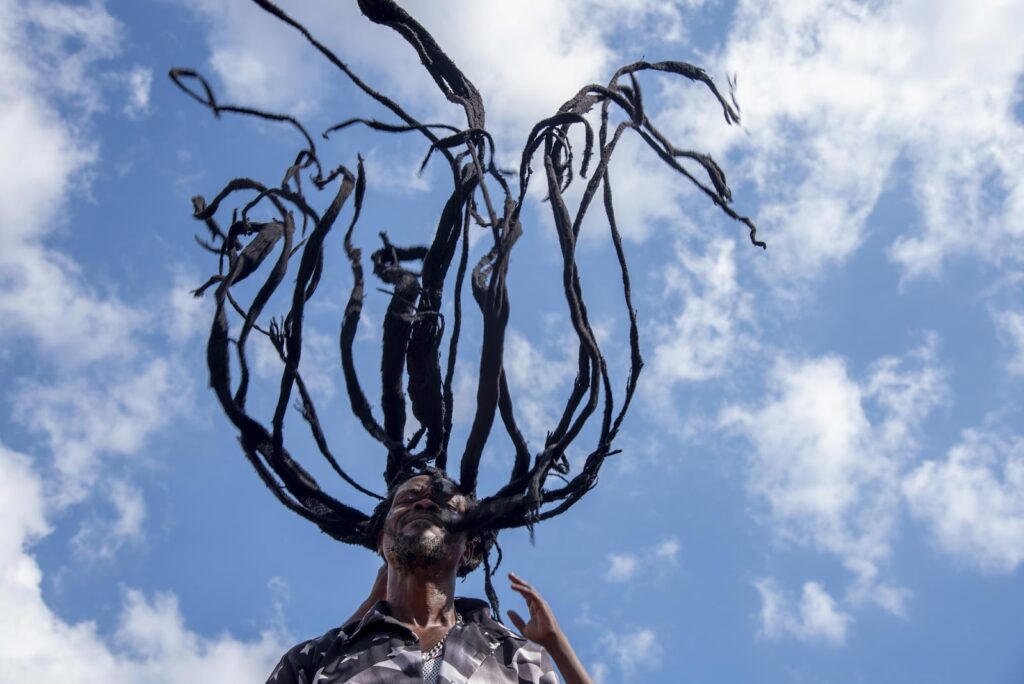
Ali Male, a psychologist at the A-Z Counseling and Support center in Kampala said public perception and stereotypes of people with dreadlocks can affect their self-esteem and confidence in terms of finding work.
“That is why you find that after such scenarios some are not coping well and then they end up drinking alcohol and increase the rate at which they abuse certain drugs,” he said, adding some people may be resilient, but when the judgment comes from close family or friends it can have a strong effect. “You find in-laws looking at their sons-in-law as a “muyaaye” (hooligans or thugs) and (this can) cause a number of mental health issues to that person just because of dreadlocks,” he said.
Male said some people see dreadlocks as a fashion choice, part of an exciting social trend.
“Unless that public understands the logic behind dreadlocks and why somebody would put on dreadlocks, then they will appreciate them,” he said. “But in (Ugandan) society where culture and religious values are used to judge certain things, it is not easy to appreciate those kinds of things.”
This report was produced by the Center for Collaborative Investigative Journalism (CCIJ), a nonprofit organization that brings together investigative reporters, visual storytellers and data scientists to investigate key global issues affecting underserved communities. This investigation was produced with the support of the National Endowment for Democracy. It was first published here.
Support Our Journalism
There are millions of ordinary people affected by conflict in Africa whose stories are missing in the mainstream media. HumAngle is determined to tell those challenging and under-reported stories, hoping that the people impacted by these conflicts will find the safety and security they deserve.
To ensure that we continue to provide public service coverage, we have a small favour to ask you. We want you to be part of our journalistic endeavour by contributing a token to us.
Your donation will further promote a robust, free, and independent media.
Donate HereStay Closer To The Stories That Matter


